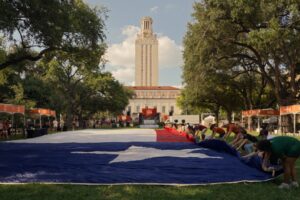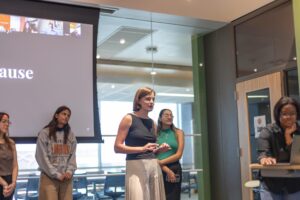AUSTIN, Texas—Two chemical engineers and a biochemist at The University of Texas at Austin will conduct novel research as charter members of a new Science and Technology Center on layered polymers that is being established with Case Western Reserve University as the lead institution.
The new Center for Layered Polymeric Systems (CLiPS) will open Aug. 1. It was one of six centers recently chosen to receive funding from the National Science Foundation (NSF) out of 160 potential centers in all scientific disciplines.
CLiPS is the only one of the six funded in the physical sciences and engineering. Like the 16 other NSF Science and Technology Centers, it will explore a new research area that involves technology, with the goal of transferring findings in a timely fashion to serve society’s needs. The center will focus on interdisciplinary collaborations involving polymers (plastics) that can be layered to serve useful purposes.
The center will receive $19 million from NSF during its first five years. It will be based at the Case School of Engineering in Cleveland, Ohio. It will also involve faculty and staff at Fisk University, a historically black university in Nashville, Tenn.
Beyond research, CLiPS will help educate a diverse American workforce that can meet the challenges of emerging multidisciplinary polymer-based technologies.
“Teamwork, strategic planning and implementation, and synergy are key factors in the success of the new NSF Science and Technology Centers,” said Nathaniel G. Pitts, director of the NSF Office of Integrative Activities. “Each has multiple partners from different science and engineering sectors, including national and international academia, industry, and federal, state and local government. The partners will enable the centers to take advantage of complex agendas that require special modes of operation. The full diversity of the nation’s intellectual talent will be engaged, and the expectation is that new knowledge will be one of the primary products, as will be the development of new instrumentation, new technologies, and future scientists and engineers.”
Anne Hiltner, the Herbert Henry Dow Professor of Science and Engineering at Case, will serve as principal investigator and center director.
Professors at The University of Texas at Austin who will participate in CLiPS teaching and polymer research are: Donald Paul, the Ernest Cockrell Sr. Chair in Engineering; Benny Freeman, the Kenneth A. Kobe Professorship in Chemical Engineering; and Andrew Ellington, the Wilson M. and Kathryn Fraser Research Professorship in Biochemistry.
Paul and Freeman will use center funds to study fundamental issues of the formation and behavior of polymers in thin layers. They will develop layered membranes that modify the oxygen and carbon dioxide atmosphere in packages of fruits and vegetables to prolong freshness. They will also explore oxygen- and water-scavenging concepts to achieve high-barrier films needed for certain food and electronic component packaging.
Ellington will study enzymatically active membranes for separations, barriers and sensors.
CLiPS program participants will conduct educational outreach about polymers to the community and to high school students in the Austin Independent School District. That outreach will help fulfill the center’s goal of encouraging students from diverse ethnic backgrounds to pursue engineering and science careers.
Pam Cook, from the university’s Department of Chemistry and Biochemistry, will serve as assistant director of educational outreach in Austin.
According to Hiltner, the goal is for CLiPS to lead the nation with an integrated program of research and education through a distinctive microlayering and nanolayering process created at Case during the last 20 years. This forced-assembly process brings together dissimilar polymers and other materials to produce hierarchical structures that are otherwise unattainable.
The CLiPS approach strategically integrates polymer science and engineering with research in nanotechnology, optics, laser physics, membranes, biomedical engineering and other scientific disciplines in the “polymers plus” concept.
To complement its pioneering research programs, CLiPS will be a model for successful recruitment of diverse American students into the science and engineering workforce. In addition to the collaboration with Fisk and outreach to Austin and Cleveland school districts, CLiPS has established affiliations with regional, non-Ph.D.-granting schools that offer strong undergraduate science and engineering programs.
For more information contact: Barbra Rodriguez, College of Engineering, 512-471-7541.



